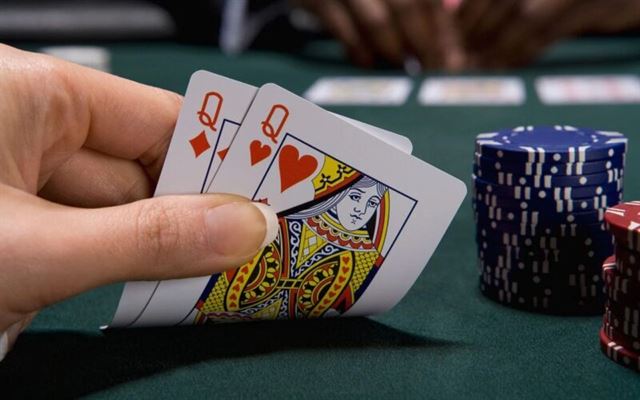Mind games and strategy play a crucial role in the world of poker, making it a fascinating game that goes beyond mere luck and chance. The psychology of winning in poker involves understanding and manipulating the thoughts, emotions, and behaviors of opponents to gain an advantage. This intricate interplay of psychological factors adds a whole new dimension to the game, making it a captivating endeavor for those who seek to master it. In this article, we will delve into the world of mind games and strategy in poker, exploring the psychological aspects that contribute to success at the poker table.
The Role of Psychology in Winning at Poker: Understanding the Mind Games
One of the key psychological factors in poker is the ability to read your opponents. By observing their behavior, body language, and betting patterns, you can gain valuable insights into the strength of their hand. A player who is confident and relaxed may have a strong hand, while someone who is fidgety or avoids eye contact may be bluffing. This skill, known as “poker tells,” can help you make more informed decisions and increase your chances of winning.
However, it is important to remember that poker tells are not foolproof. Skilled players are aware of their own tells and may intentionally use them to deceive their opponents. This is where the concept of reverse tells comes into play. By deliberately displaying false tells or acting in a way that contradicts the strength of their hand, players can manipulate their opponents into making poor decisions. Recognizing and deciphering these reverse tells is a crucial skill for any serious poker player.
Another psychological aspect of poker is the ability to control your emotions. The game can be highly stressful, especially during high-stakes tournaments or when facing significant losses. Emotions such as fear, anger, or frustration can cloud your judgment and lead to impulsive decisions. Successful poker players understand the importance of maintaining a calm and composed demeanor, even in the face of adversity. By mastering their emotions, they can make rational decisions based on logic and strategy rather than being swayed by temporary emotional states.
Furthermore, understanding the concept of tilt is essential for any poker player. Tilt refers to a state of emotional and mental frustration that can occur after a series of bad beats or losses. When a player is on tilt, they are more likely to make irrational and reckless decisions in an attempt to recoup their losses. Recognizing when you are on tilt and taking steps to regain control of your emotions is crucial to avoid further losses and maintain a winning mindset.
In addition to reading opponents and managing emotions, successful poker players also employ various mind games to gain an advantage. These mind games involve manipulating the perceptions and expectations of your opponents to influence their decision-making process. For example, a player may intentionally play aggressively to create the impression of a strong hand, causing their opponents to fold. Alternatively, they may play passively to induce their opponents to bet more, only to strike back with a strong hand. These strategic maneuvers require a deep understanding of human psychology and the ability to adapt your playing style accordingly.
Mastering Poker Strategy: How Psychology Can Give You an Edge
One of the key psychological aspects of poker is the ability to read your opponents. By observing their behavior, body language, and betting patterns, you can gain valuable insights into their hand strength and intentions. This skill, known as “poker tells,” can be honed through practice and experience. For example, a player who nervously taps their fingers on the table may be bluffing, while a player who avoids eye contact may have a strong hand. By paying attention to these subtle cues, you can make more informed decisions and increase your chances of winning.
Another important psychological aspect of poker is managing your emotions. The game can be highly stressful and emotionally charged, especially during high-stakes tournaments. It is crucial to remain calm and composed, regardless of the outcome of each hand. Emotionally driven decisions are often irrational and can lead to costly mistakes. By maintaining a clear and rational mindset, you can make better decisions based on logic and probability.
Furthermore, understanding the concept of tilt is essential for any serious poker player. Tilt refers to a state of emotional frustration or anger that can cloud your judgment and lead to reckless play. It often occurs after a series of bad beats or unlucky hands. Recognizing when you are on tilt and taking steps to regain control of your emotions is crucial for long-term success in poker. This can be achieved through techniques such as deep breathing, taking breaks, or seeking support from fellow players.
In addition to managing your own emotions, it is equally important to exploit the emotions of your opponents. Poker is a game of deception, and skilled players use this to their advantage. By manipulating the emotions of your opponents, you can induce them to make mistakes or play predictably. For example, if you have a strong hand, you may act disinterested or hesitant to encourage your opponents to bet more. Conversely, if you have a weak hand, you may act confident and aggressive to intimidate your opponents into folding. By understanding the psychology of your opponents, you can gain a significant edge at the poker table.
Lastly, understanding the concept of risk and reward is crucial in poker strategy. Every decision you make in the game involves a certain level of risk, and understanding how to calculate and manage that risk is essential. This requires a deep understanding of probability and expected value. By analyzing the potential outcomes of each decision and weighing them against the potential rewards, you can make more informed and profitable decisions in the long run.
The Psychology of Bluffing: Unveiling the Secrets to Successful Poker
Bluffing is a fundamental aspect of poker that involves deceiving your opponents into believing that you have a stronger hand than you actually do. It is a strategic move that can be used to intimidate opponents, force them to fold, and ultimately win the pot. However, successful bluffing requires a deep understanding of human psychology and the ability to read your opponents’ behavior.
One of the key factors in successful bluffing is timing. Knowing when to bluff and when to fold is crucial. Bluffing too often can make you predictable and easily exploitable, while bluffing too rarely can make your opponents suspicious of your strong hands. It is a delicate balance that requires careful observation and analysis of your opponents’ playing styles.
Another important aspect of bluffing is the ability to control your emotions. Poker is a game that can evoke strong emotions, such as excitement, frustration, and fear. It is essential to keep a calm and composed demeanor, regardless of the cards you hold. Any sign of nervousness or anxiety can give away your bluff and make your opponents more likely to call your bet.
To successfully bluff, you must also be able to read your opponents’ behavior and detect any signs of weakness or strength. This requires paying close attention to their body language, facial expressions, and betting patterns. For example, if an opponent suddenly starts fidgeting or avoiding eye contact, it could be a sign that they are bluffing. On the other hand, if they appear confident and make large bets, it could indicate a strong hand.
However, it is important to note that reading opponents accurately is not an exact science. People have different playing styles and can be skilled at disguising their true intentions. Therefore, it is crucial to gather as much information as possible before making a decision. This can be done by observing your opponents’ behavior over multiple hands and taking note of any patterns or tendencies.
In addition to reading opponents, successful bluffing also involves manipulating your opponents’ perceptions. This can be done by carefully controlling the information you reveal and the bets you make. For example, making a small bet on a weak hand can give the impression that you have a strong hand, while making a large bet on a strong hand can make your opponents believe that you are bluffing.
Reading Your Opponents: Using Psychology to Predict and Outsmart in Poker
One of the first things to consider when trying to read your opponents is their body language. Non-verbal cues can reveal a lot about a person’s hand and intentions. For example, a player who is leaning back in their chair and avoiding eye contact may be bluffing, trying to appear relaxed and confident. On the other hand, someone who is leaning forward, with a tense posture and dilated pupils, may have a strong hand and be ready to pounce. By observing these subtle cues, you can gain valuable insights into your opponents’ strategies.
Another important aspect of reading your opponents is paying attention to their betting patterns. How much they bet, when they bet, and how they react to others’ bets can provide valuable information. For instance, a player who consistently raises before the flop may have a strong hand, while someone who frequently checks or calls may be playing cautiously with a weaker hand. By analyzing these patterns, you can make more informed decisions about your own bets and adjust your strategy accordingly.
Psychology also plays a significant role in predicting your opponents’ moves. Understanding the concept of “tells” is crucial in this regard. A tell is a subconscious action or behavior that reveals information about a player’s hand. It could be something as subtle as a slight twitch or a change in breathing pattern. By studying your opponents and identifying their tells, you can gain a significant advantage at the table.
However, it’s important to note that not all tells are reliable. Some players may intentionally give false tells to deceive their opponents. This is where the concept of reverse psychology comes into play. By intentionally displaying false tells or acting in a way that contradicts their actual hand, players can manipulate their opponents into making poor decisions. This strategy requires a deep understanding of human psychology and the ability to control your own emotions.
In addition to reading your opponents, it’s essential to be aware of how you are being perceived at the table. Your own body language, betting patterns, and reactions can also give away valuable information to your opponents. Therefore, it’s crucial to maintain a consistent and unpredictable demeanor to keep your opponents guessing. By mastering the art of deception and maintaining a poker face, you can make it difficult for your opponents to read you accurately.
In conclusion, reading your opponents and using psychology to predict and outsmart them is a crucial aspect of winning in poker. By observing their body language, analyzing their betting patterns, and understanding their tells, you can gain valuable insights into their strategies. However, it’s important to remember that psychology works both ways, and your opponents will also be trying to read you. Therefore, maintaining a consistent and unpredictable demeanor is essential. With practice and a deep understanding of human psychology, you can become a master at the mind games of poker and increase your chances of coming out on top.






